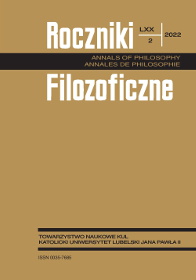Apofatyzm filozoficzny a Michała Hellera idea matematyczności przyrody
Abstrakt
Wychodząc od usystematyzowania hellerowskiej tezy o matematyczności przyrody, niniejsze studium poświęcone głównie będzie pokazaniu i krytycznej ocenie racji, wedle których Heller desygnuje teorię kategorii jako matematyczne środowisko szczególnie predestynowane dla wyartykułowania tej tezy. Kluczowe w tym kontekście będzie wskazanie, co uprawnia go do wprowadzenia mającej istotne ontologiczne znaczenie koncepcji pola kategorii i utożsamienia go z polem racjonalności. Ostatecznie stanie się możliwe lepsze zrozumienie, w jakim sensie w kontekście sformalizowanych teorii fizycznych Heller operuje pojęciem apofatyzmu filozoficznego, który wydaje się trafnie ujmować specyfikę jego poglądów na ontologiczne zobowiązania tych teorii i gdzie być może zbliża się on do niebezpiecznych myślowych pułapek. W swojej apofatycznej postawie Heller pozostaje blisko pierwszoplanowych postaci współczesnej fizyki i noblistów, Alberta Einsteina czy Rogera Penrose’a: fizyka nie mówi o tym, jaka rzeczywistość jest, ale pozwala stanąć na drodze do rzeczywistości.
Bibliografia
Awodey, Stephen. 2004. ,,An Answer to Hellmann’s Question: Does Category Theory Provide a Framework for Mathematical Structuralism?” Philosophia Mathematica 12 (1): 54–64.
Dembiński, Bogdan. 2006. Późny Platon i Stara Akademia. Kęty: Marek Derewiecki.
Dzidek, Tadeusz, i Piotr Sikora. 2006. ,,Natura teologii”. W: Teologia fundamentalna, t. 5, Poznanie teologiczne, red. Tadeusz Dzidek, Łukasz Kamykowski i Andrzej Napiórkowski, 63–66. Kraków: Wydawnictwo Naukowe PAT.
Einstein, Albert. 2001a. „Jak widzę świat”. W: Albert Einstein. Pisma filozoficzne, red. Stanisław Butryn, 379–83. Warszawa: De Agostini Polska, Ediciones Altaya Polska.
Einstein, Albert. 2001b. „O nauce”. W: Albert Einstein. Pisma filozoficzne, red. Stanisław Butryn, 151–54. Warszawa: De Agostini Polska, Ediciones Altaya Polska.
Grygiel, Wojciech P. 2010. „Matematycy o matematycznym platonizmie. Zapis ciekawej dyskusji”. Logos i ethos 29 (2): 7–26.
Grygiel, Wojciech P. 2014. Stephena Hawkinga i Rogera Penrose’a spór o rzeczywistość. Kraków: Copernicus Center Press.
Grygiel, Wojciech P. 2017. „W obliczu tajemnicy: teologiczna myśl ks. Michała Hellera”. W: Oblicza filozofii w nauce, red. Paweł Polak, Janusz Mączka i Wojciech P. Grygiel, 337–69. Kraków: Copernicus Center Press.
Grygiel, Wojciech P. 2021. Jak scena stała się dramatem: filozofia w kontekście teorii względności. Kraków: Copernicus Center Press.
Hawking, Stephen W., i Roger Penrose. 1996. The Nature of Space and Time. Princeton: Princeton University Press.
Heller, Michał. 1997. Uchwycić przemijanie. Kraków: Znak.
Heller, Michał. 2004. Filozofia przyrody: zarys historyczny. Kraków: Znak.
Heller, Michał. 2006a. „Czy świat jest racjonalny?” W: Tenże, Filozofia i wszechświat, 37–47. Kraków: Universitas.
Heller, Michał. 2006b. „Przeciw fundacjonizmowi”. W: Tenże, Filozofia i wszechświat, 82–101. Kraków: Universitas.
Heller, Michał. 2006c. „Czy świat jest matematyczny?” W: Tenże, Filozofia i wszechświat, 48–57. Kraków: Universitas.
Heller, Michał. 2006d. „Kilka uwag o języku i ontologii”. W: Tenże, Filozofia i wszechświat, 157–60. Kraków: Universitas.
Heller, Michał. 2006e. „Quine i Gödel – jeszcze o ontologicznych interpretacjach fizycznych teorii”. W: Tenże, Filozofia i wszechświat, 161–70. Kraków: Universitas.
Heller, Michał. 2006f. „Czasoprzestrzeń w fizyce i kosmologii”. W Tenże, Filozofia i wszechświat, 354–70. Kraków: Universitas.
Heller, Michał. 2008. Ostateczne wyjaśnienia Wszechświata. Kraków: Universitas.
Heller, Michał. 2010. „Co to znaczy, że przyroda jest matematyczna?” W: Tenże, Matematyczność przyrody, red. Michał Heller i Józef Życiński, 7–18. Kraków: Petrus.
Heller, Michał. 2011. Elementy mechaniki kwantowej dla filozofów. Kraków: OBI.
Heller, Michał. 2014. „The Field of Rationality and the Category Theory”. W: Mathematical Structures of the Universe, red. Michał Eckstein, Michał Heller i Sebastian Szybka, 441–57. Kraków: Copernicus Center Press.
Heller, Michał. 2016a. „Lectio magistralis: Teologia dzisiaj – detronizowanie królowej?” W: Promotio Doctoris Honoris Causa Pontificiae Universitatis Cracoviensis Joannis Pauli II, red. Monika Wiertek, 53–62. Kraków: Uniwersytet Jana Pawła II.
Heller, Michał. 2016b. Wierzę, żeby zrozumieć. Kraków: Znak.
Heller, Michał. 2016c. „Teoria kategorii, logika i filozofia”. Filozofia Nauki 24 (2): 5–15.
Hughes, R. I. G. 1989. The Structure and Interpretation of Quantum Mechanics. Cambridge, MA, London: Harvard University Press.
Krajewski, Stanisław. 2003. Twierdzenie Gödla i jego filozoficzne interpretacje. Warszawa: Wydawnictwo IFiS PAN.
Krąpiec, Mieczysław A. 1995. Struktura bytu. Lublin: Redakcja Wydawnictw KUL.
MacLane, Saunders. 1998. Categories for the Working Mathematician. New York: Springer.
Penrose, Roger. 1994. Shadows of the Mind. New York: Oxford University Press.
Penrose, Roger. 2006. Droga do rzeczywistości. Warszawa: Prószyński i S-ka.
Quine, Willard v. O. 1969. „O tym, co istnieje”. W: Tenże, Z punktu widzenia logiki, 9–34. Warszawa: PWN.
Redhead, Michael. 2001. „The Intelligibility of the Universe”. W: Philosophy at the New Millenium, red. Anthony O’Hear, 73–90. Cambridge: Cambridge University Press.
Stopa, Mariusz. 2018. „Teoria kategorii i niektóre jej logiczne aspekty”. Zagadnienia Filozoficzne w Nauce 64:7–58.
Tegmark, Max. 2015. Our Mathematical Universe. London: Penguin Books.
Wigner, Eugene P. 1960. „The Unreasonable Effectiveness of Mathematics in the Natural Sciences”. Communications in Pure and Applied Mathematics 13 (1): 1–14.
Wójtowicz, Krzysztof. 2002. Platonizm matematyczny. Studium filozofii matematyki Kurta Gödla. Tarnów: Biblos.
Życiński, Józef. 1987. „Filozoficzne aspekty matematyczności przyrody”. W Filozofować w kontekście nauki, red. Michał Heller, Alicja Michalik i Józef Życiński, 170–85. Kraków: Polskie Towarzystwo Teologiczne.
Życiński, Józef. 2010. „Jak rozumieć matematyczność przyrody?” W: Matematyczność przyrody, red. Michał Heller i Józef Życiński, 19–36. Kraków: Petrus.
Życiński, Józef. 2013a. Świat matematyki i jej materialnych cieni. Kraków: Copernicus Center Press.
Życiński, Józef. 2013b. Struktura rewolucji metanaukowej. Kraków: Copernicus Center Press.
Copyright (c) 2022 Roczniki Filozoficzne

Utwór dostępny jest na licencji Creative Commons Uznanie autorstwa – Użycie niekomercyjne – Bez utworów zależnych 4.0 Międzynarodowe.





